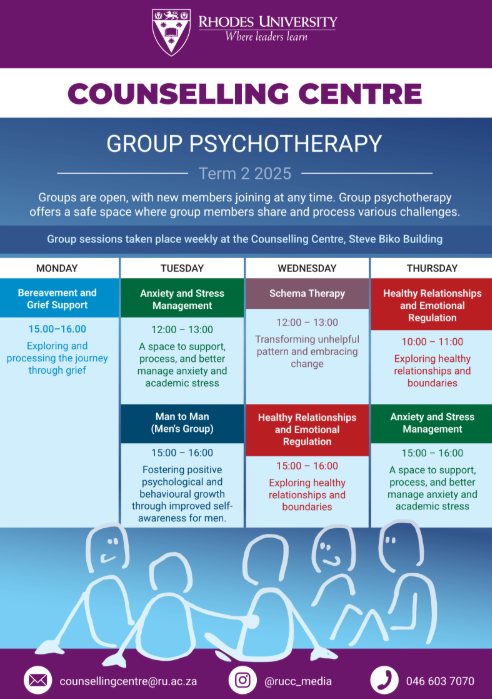![As sunlight filtered through the trees and the gentle sound of water flowed nearby, there was a space for intentional reflection [PHOTO CREDIT: Khanya Jordan Tyhalwa]](/media/rhodesuniversity/content/communicationsmarketing/images/cbb27d9b-91e7-49cb-835c-d43d1b6c5113.JPG)
By: Ephreeda Banda
As exams loom over Rhodes University, a small but meaningful initiative reminded students to pause and prioritise something often overlooked during academic stress: their mental well-being. On a crisp Makhanda morning, a pair of wellness walks, organised by the University’s residence wellness representatives, encouraged students to breathe deeply, self-reflect, and begin their day with intention.
The walks, held at 7 am and 9 am, were part of a growing movement to make mental health care more accessible and less stigmatised among students. Though quiet and simple in format, they sent a powerful message: it is okay to slow down.
The first session, held at the 1820 Settler's National Monument, was facilitated by Boiketlo Lamula, the Wellness and Transformation Rep from Victoria Mxenge House. The Monument offered a scenic overlook of Grahamstown - an ideal setting to start the day grounded in nature and reflection. “I decided to do this early morning session because I enjoy the morning hours myself, so I thought it would be nice to be out,” said Lamula. “I put myself up for this challenge. It is very refreshing for me.”
For Lamula, creating the walk was personal. The activities she included were drawn from her own experiences and the practices that helped her stay centred during difficult times. “The plan was quite easy for me because a lot of the stuff I decided to do is something that I have done before and find helpful,” she explained. “I just hoped that showing it to others might help them too. Maybe they could gain insight into dealing with stress or what to do in a difficult time.”
Still, organising the walk came with uncertainty. “Executing it was difficult because I wasn’t sure if people were really interested or if they just didn’t understand what to do,” Lamula admitted. “But I only hope that I’ve done my best.”
Two hours later, a different group of students gathered at the Botanical Gardens for the 9 am walk and journaling session led by Noluthando Zulu, the Oppidan Wellness Representative. As sunlight filtered through the trees and the gentle sound of water flowed nearby, Zulu created a space for intentional reflection. “The whole purpose behind this walk and journaling session is just to get students to relax, to calm down, and to get them to self-reflect just before exam season,” said Zulu. “We get that many students are under pressure right now, especially since it’s the end of the semester.”
Participants carried small notebooks as they moved through the gardens, pausing at soothing spots - benches, shaded tree areas, or quiet corners near water. At each stop, Zulu asked guiding questions to encourage self-awareness: What are you proud of so far? Where are you hoping to go in life? What disappointments have you had to confront this semester? “We’re confronting things that we’ve been avoiding, like confronting our fears,” she said. “We’re encouraging and letting each other know that life doesn’t have to be perfect to be meaningful.”
More than just a walk, the session allowed students to feel seen and heard in a way that academic spaces often do not make room for. In that vulnerability, there was strength and solidarity. Zulu also emphasised the importance of creating wellness activities that feel natural and rooted in lived experience.
In both sessions, students were reminded they were not alone in their struggles. University life is challenging, not only intellectually but emotionally, and the burden of always seeming ‘okay’ can be isolating. These walks challenged that norm gently but powerfully, offering a quiet space for honesty, encouragement, and connection.
As the exam season begins in earnest, both Lamula and Zulu’s sessions highlight an urgent truth: mental health care is not optional. It is necessary. Whether through walking, journaling, or speaking openly, taking time to care for one’s mind is not a weakness but a strength. As these wellness walks demonstrated, sometimes the most meaningful thing a student can do is take a breath, reflect and know that they do not have to carry the pressure alone.

